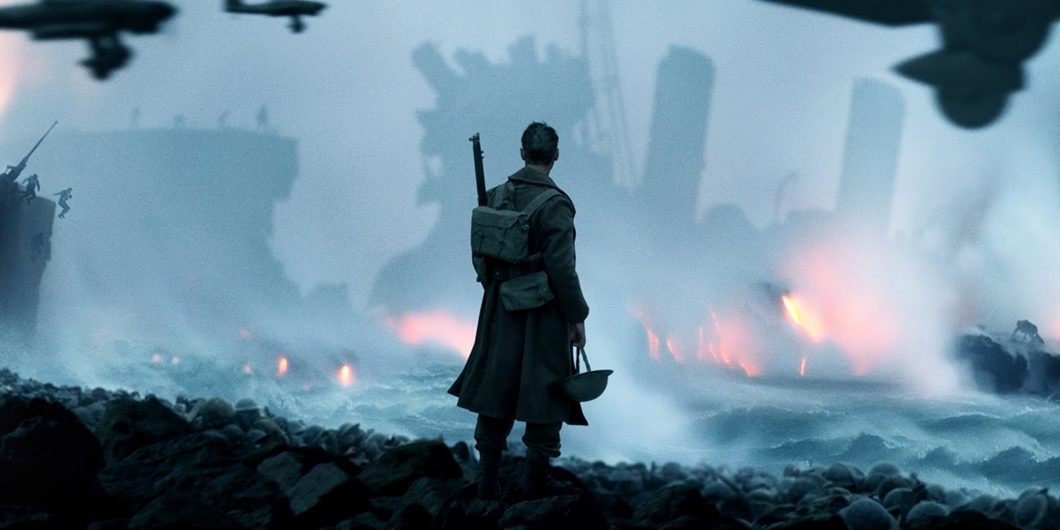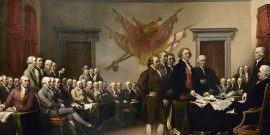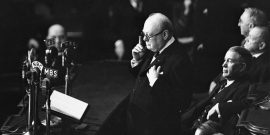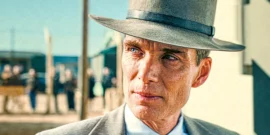Not so long ago, statesmen delivered speeches to reforge a sense of national identity by invoking the principles of the Declaration of Independence.
Christopher Nolan’s Tribute to Churchill
For all our anger and partisanship, we live in a time of confusion—we lack consensus about what greatness in politics might mean. But our politics and greatest thinkers strongly suggest that great politicians play a part in guiding a people to consensus about their predicament and the course they ought to take. The greatest politicians within living memory are FDR and Churchill. Churchill was also the greatest historian of his time, which makes him the better teacher of politics. But who will teach us about Churchill?
Churchill refused to write about himself as a hero out of respect for legitimacy, which forces us to look somewhere else. I have a surprising source: Christopher Nolan, our poet of heroism in an age that disdains poetry.
Nolan’s movie Dunkirk is a necessary introduction to Churchill’s greatness because it shows in a uniquely persuasive way the crisis he overcame, the possible defeat of his country and the entire collapse of Europe in one fateful moment when the entire British Expeditionary Force was about to be destroyed or captured. We are not without eulogies of Churchill—he’s the most written about modern politician, rivaled only by Napoleon. But while he is popular, Churchill is despised by elites, and where he is taken seriously by them, he is unpopular. The result is that we have learned little if anything from him.
Nolan wants to fix this paradox by making a new beginning. His signal achievement is to teach us not to take a happy ending for granted—not to chain our moral imagination to the arrogance of hindsight. He gives us a more urgent and livelier understanding of the truth in Churchill’s most famous speeches, the “Blood, toil, tears, and sweat” speech—his first as PM—and the speech after Operation Dynamo, the Dunkirk evacuation: “We shall fight on the beaches!” That’s what we need now in order to understand what political speeches can accomplish. It is fitting that we should do so since Churchill addressed himself not only to the British people, but also to America, where he looked for help and where Nolan’s movie points in its conclusion.
Fending Off Decadence
Without realizing it, nowadays we boast of Churchill. Today’s self-importance rests upon Churchill’s eventual victory. We are only able to boast because he won the most hopeless battle in modern history. We experience none of his suffering, nor that of his people, but can take in as much of the afterglow of victory as we can stand. We can even think ourselves better than others for knowing Churchill and feel noble without having done anything.
Nolan’s solution to this problem is a return to the terror where nobility is born. He takes his audience—those who know Churchill and those who’ve never even heard of Dunkirk—and offers us a poetic equivalent of Churchill’s rhetoric—blood, toil, tears, and sweat. The moral seriousness of that rhetoric becomes obvious in this movie in a way it’s never been before. Not only do we not study history, but our military is a small volunteer force apart from the citizenry. This means that poetry will—poetry must—provide citizens with an education, lest we remain ignorant of one half of politics: War.
Dunkirk’s civilizing effort, however, has detractors who complain about the suffering, the agony on display in this movie. But this is a political requirement of freedom—we are incomplete as citizens in an important way without this experience. A willingness to bear witness to this dramatized suffering is almost an act of piety—as free men and women, to be shown how our freedom is defended.
Cinema may be the part of our national experience least connected with action, but it’s the best remaining source of popular edification. Our newspapers do not publish the text of political speeches—and when our politicians have lost the capacity for delivering great oratory, why would they? Our moral imaginations are fed not on words, but images, and since none of our politicians are great, we are overwhelmed by glittering mediocrity. This may be a sobering teaching, but Nolan is the most sober poet of our times. Dunkirk especially shows he cares more about making us capable of learning what greatness in politics means than our elites.
War Rhetoric
Indeed, if you were to read or listen to the two Churchill speeches I mention above, you might notice on comparing them with Dunkirk that the film makes Churchill’s words come alive. Through the lives and drama of many men, Churchill’s high-minded conception of war and politics becomes more obvious, easier to grasp, and more affecting. This should be a lesson to us all; this should give us hope even as it encourages us to imitate this example.
Dunkirk doesn’t simply leave us with the experience of war’s terrors. It does not merely show us ordinary soldiers, sailors, and airmen struggle to survive, but reveals how our most precious individuality becomes throwaway. War indeed cannot make for greatness without endangering even ordinary humanity. And so, these men are not quite “individual” and none of the characters is “developed.” They look rather similar and, in the melee, can be confused. Indeed, Dunkirk intends to articulate the full possibility of greatness inherent in the situation—from the ordinary, to the wicked, to the heroic.
This brings us back to Churchill. Nolan reveals to us what a bloody resolve it takes to utter his most famous peroration:
We shall go on to the end, we shall fight in France, we shall fight on the seas and oceans, we shall fight with growing confidence and growing strength in the air, we shall defend our Island, whatever the cost may be, we shall fight on the beaches, we shall fight on the landing grounds, we shall fight in the fields and in the streets, we shall fight in the hills; we shall never surrender, and even if, which I do not for a moment believe, this Island or a large part of it were subjugated and starving, then our Empire beyond the seas, armed and guarded by the British Fleet, would carry on the struggle, until, in God’s good time, the New World, with all its power and might, steps forth to the rescue and the liberation of the old.
Dunkirk gives more evidence of what Churchill means than we could want; it gives us not so much a happy end as much-needed relief after an ordeal. This, too, is taken from Churchill, this time the speech on the evacuation:
This struggle was protracted and fierce. Suddenly the scene has cleared, the crash and thunder has for the moment—but only for the moment—died away. A miracle of deliverance, achieved by valor, by perseverance, by perfect discipline, by faultless service, by resource, by skill, by unconquerable fidelity, is manifest to us all.
Churchill is not afraid to speak providentially—he means to spur men to action, not to reassure them events will sort themselves out. This is needed in our times as much as in his—this is where Nolan learnt to eschew a happy end and instead to look for the true revelation of the event, the subtlety in the midst of catastrophe. Again, Churchill speaks of Dunkirk:
We must be very careful not to assign to this deliverance the attributes of a victory. Wars are not won by evacuations. But there was a victory inside this deliverance, which should be noted. It was gained by the Air Force. Many of our soldiers coming back have not seen the Air Force at work; they saw only the bombers which escaped its protective attack. They underrate its achievements. I have heard much talk of this; that is why I go out of my way to say this.
Churchill and Nolan frankly and firmly correct the incomplete perspective of the men on the ground, yearning for escape. Only here, where Churchill differed with public opinion, did he act as an educator of his people. This is of great importance, because the national memory is at stake—the men of Dunkirk might themselves end up denying human greatness! It is part of the purpose of great rhetoric to tell the comprehensive truth about a political situation, to put together what we see and what we don’t see, as much for the use of posterity as for the urgency of the times. Churchill is especially sensitive to defend heroism, especially the unsung:
There never has been, I suppose, in all the world, in all the history of war, such an opportunity for youth. The Knights of the Round Table, the Crusaders, all fall back into the past-not only distant but prosaic; these young men, going forth every morn to guard their native land and all that we stand for, holding in their hands these instruments of colossal and shattering power, of whom it may be said that “Every morn brought forth a noble chance / And every chance brought forth a noble knight,” deserve our gratitude, as do all the brave men who, in so many ways and on so many occasions, are ready, and continue ready to give life and all for their native land.
There you have the ultimate source of the story Nolan tells. He gives us the man of the hour, a pilot who embodies traditional English virtues and whom we see again and again throughout the movie, even though he is apart from the agony on the beaches of Dunkirk, since we have to become used to him, familiar although anonymous, in order to understand his saving action, which in a strange sense simply follows from who he is. He is the quiet, but necessary complement of the weakness of which we complain. The fate of that man is to sacrifice himself, which he does as quietly as he had heroically defended those on the ground. He shows us what it means to “never surrender”—down to the moment at the end of the movie when he has to land his plane in France, alone, abandoned, in a sense, by all the men he had protected. As the plane runs out of fuel, he has to engage the wheel train, which is stuck—he works the mechanism again and again, methodically, relentlessly, until the lever does its work, and the wheels engage. No thought of suicide in such a man. Further, after he lands, he sets his machine on fire with the little fuel reserved for the purpose, to give no aid to the enemy. This is a noble man, because he is unsentimental. All of this, too, is done quietly, and the eloquence of the gestures depends on our moral capacity to be moved by danger to prefer the great to the mediocre.
Nolan wants us to experience, if briefly, a man on whom the hopes of so many trapped soldiers depend. The Christians among us may think of his decisions as providential, not to say angelic. He shows us, though faceless for most of the movie, the character of a man who never gives up. Without bluster, he is shown earning the praise Churchill so poetically bestowed in that speech—and acting in a way that deserves praise but will almost certainly never receive it.
Nolan does not want this character to obstruct from the story or to dominate it—but to reveal the truth of the event. The plot of the movie is very simple, but Nolan introduces one of his typical poetic devices—to mix up the story of a week (the army), a day (the navy), and an hour (the air force), to bring everything to that climax. What fails to make sense chronologically begins to make sense poetically and politically, because it places the pilot at the climax only after it has established the circumstances in which he acted and the need for him to do what he did. That is a small show of poetic mastery of historical events that should be studied.
Heroism And Nihilism
In his youth, Churchill had prophesied cruel industrial wars. His description of a British machine-gun crew slaughtering untold numbers of the Mahdi’s brave fanatics in the Sudan at the turn of the 20th century makes the soldiers seem like workers in a factory. War would be far more of a man-killer in future; but it would kill heroism, too. Modern wars are democratic, swallowing up human greatness even as they devour entire nations. Churchill exalts the pilots of the Royal Air Force above crusaders and Arthurian knights, saviors of England and Christendom.
These pilots allow Britain not only to defend herself, but to do so in a noble way, without succumbing to the cruel ugliness of modern warfare. They defend not only life, but what makes life worth living, by acting admirably. Every ambition of heroism is in a sense fulfilled in flying. Thus, this real event, narrated by a politician, not a myth told by the poet Lord Tennyson like King Arthur, announces the enduring possibility of greatness, leading up to the immortal phrase, “their finest hour.” It also animates Nolan’s moviemaking.
That is the secret hidden in plain sight in the complexity of film’s timeline. Nolan wants us to experience, if briefly, a man on whom the hopes of so many trapped soldiers depend. The Christians among us may think of his decisions as providential, not to say angelic. He shows us, though faceless for most of the movie, the character of a man who never gives up. Without bluster, he is shown earning the praise Churchill so poetically bestowed in that speech—and acting in a way that deserves praise but will almost certainly never receive it.
This kind of man is the keystone of an army. We see two of them in the movie. They are especially Stoic—they show little feeling, they face their situation with a calculating mind. Without giving signs of fear or desperation, they intend to fulfill their orders and even go beyond them, in the direction they point. Beyond justice lies nobility; justice alone is not enough for human beings. Given the danger, these men may seem unfeeling—they are doing their best to remain in command of themselves. The terrible danger does remind us that our mortality makes us equal, but it can also blind people to the differences between men, attention to which is of utmost importance if an operation is to be successful. The pilot is conspicuous by his successes in a story where most enterprises fail.
Both Nolan and Churchill tell us that such men are invaluable, because they guarantee our individuality when we stand to lose it. They make war more moral than it otherwise would be. This story is not lacking in shocking deeds, I note in passing, since part of the ugliness Nolan descends to in his public service includes visions of cruel, mad men who hold nothing sacred. It is only against the spectacle of heroism that we can even understand that depravity. Churchill recognized that these men were often invisible, which leads the soldiers on the ground into resentment and recrimination. Nolan made one such man visible and bid us follow him into the dark places he goes. We gradually wake up to his special importance in the plot and are with him, as with the men on the ground, at the moment of climax. That is what Churchill wanted. That is how the suffering and the dignity of man are bound together, and that is what makes Dunkirk memorable.



